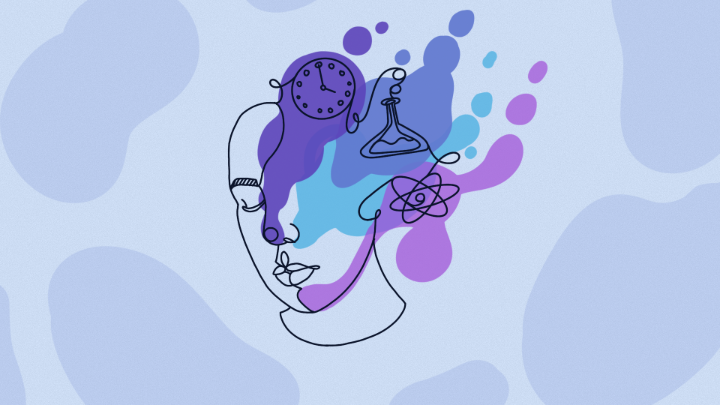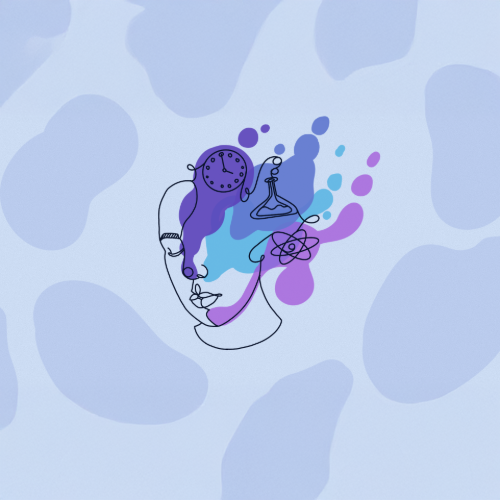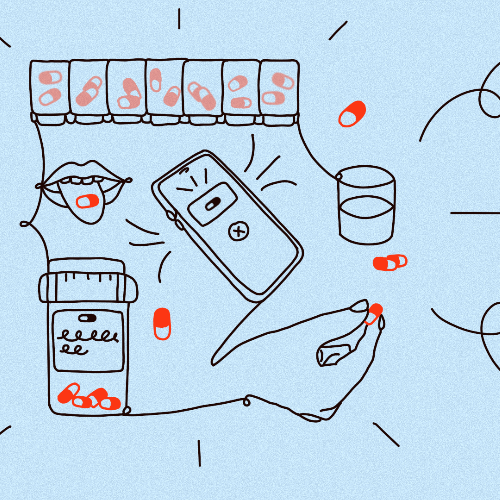Cookie Preferences
By clicking, you agree to store cookies on your device to enhance navigation, analyze usage, and support marketing. More Info
Thank you! Your submission has been received!
Oops! Something went wrong while submitting the form.

Background:
Traditional measures of obesity, like body mass index (BMI) and waist circumference, have been linked to ADHD risk — but they aren’t great at capturing where fat is actually stored in the body. A newer index called relative fat mass (RFM), which combines height and waist circumference, does a better job of estimating overall body fat and predicting metabolic risks like heart disease and metabolic syndrome. Because those conditions share some underlying biological mechanisms with ADHD, researchers wondered whether RFM might also help explain the relationship between obesity and ADHD — particularly in children.
That question is complicated by the fact that ADHD doesn't look the same in boys and girls. Boys tend to display more hyperactive and impulsive behavior, making their ADHD easier to spot. Girls more often show inattention, which is quieter and frequently goes undiagnosed.
The Study:
A new study set out to test whether RFM is associated with ADHD in children, and whether that association differs between sexes. Using data from the National Health and Nutrition Examination Survey (NHANES) collected between 1999 and 2004, the researchers narrowed a large initial pool of over 31,000 participants down to 5,089 children and adolescents aged 6 to 14 who had complete data on height, waist circumference, ADHD screening, and other relevant variables.
After adjusting for age, race/ethnicity, Poverty-Income Ratio, maternal age at delivery, maternal smoking during pregnancy, health insurance coverage, and birth weight, the results revealed a striking split along sex lines.
In boys, higher RFM was associated with lower odds of ADHD. Compared to boys in the lowest fat-mass quartile, those in the second quartile had about 10% lower odds of ADHD, rising to over 30% lower in the third quartile and nearly 40% lower in the highest. In girls, the pattern reversed entirely. While girls in the second quartile showed similar odds to those with the lowest RFM, girls in the third and fourth quartiles had 60% to 70% greater odds of ADHD.
Conclusion & Why This Matters:
In recent years, the relationship between obesity and ADHD has become an increasingly important focus in pediatric neurodevelopmental research. Studies have reported higher rates of ADHD symptoms among children and adolescents with obesity compared with their non-obese peers, and difficulties with peer relationships have also been linked to increased obesity risk (Sönmez et al., 2019). From a neurobiological standpoint, both conditions may involve shared underlying mechanisms, particularly dysfunction in dopaminergic pathways.
The authors concluded that higher body fat levels appear to lower ADHD risk in boys while raising it in girls. This finding highlights why sex-specific analysis matters in ADHD research. The underlying biological reasons for this divergence, however, remain an open question and open the door for future research.

Background:
Traditional measures of obesity, like body mass index (BMI) and waist circumference, have been linked to ADHD risk — but they aren’t great at capturing where fat is actually stored in the body. A newer index called relative fat mass (RFM), which combines height and waist circumference, does a better job of estimating overall body fat and predicting metabolic risks like heart disease and metabolic syndrome. Because those conditions share some underlying biological mechanisms with ADHD, researchers wondered whether RFM might also help explain the relationship between obesity and ADHD — particularly in children.
That question is complicated by the fact that ADHD doesn't look the same in boys and girls. Boys tend to display more hyperactive and impulsive behavior, making their ADHD easier to spot. Girls more often show inattention, which is quieter and frequently goes undiagnosed.
The Study:
A new study set out to test whether RFM is associated with ADHD in children, and whether that association differs between sexes. Using data from the National Health and Nutrition Examination Survey (NHANES) collected between 1999 and 2004, the researchers narrowed a large initial pool of over 31,000 participants down to 5,089 children and adolescents aged 6 to 14 who had complete data on height, waist circumference, ADHD screening, and other relevant variables.
After adjusting for age, race/ethnicity, Poverty-Income Ratio, maternal age at delivery, maternal smoking during pregnancy, health insurance coverage, and birth weight, the results revealed a striking split along sex lines.
In boys, higher RFM was associated with lower odds of ADHD. Compared to boys in the lowest fat-mass quartile, those in the second quartile had about 10% lower odds of ADHD, rising to over 30% lower in the third quartile and nearly 40% lower in the highest. In girls, the pattern reversed entirely. While girls in the second quartile showed similar odds to those with the lowest RFM, girls in the third and fourth quartiles had 60% to 70% greater odds of ADHD.
Conclusion & Why This Matters:
In recent years, the relationship between obesity and ADHD has become an increasingly important focus in pediatric neurodevelopmental research. Studies have reported higher rates of ADHD symptoms among children and adolescents with obesity compared with their non-obese peers, and difficulties with peer relationships have also been linked to increased obesity risk (Sönmez et al., 2019). From a neurobiological standpoint, both conditions may involve shared underlying mechanisms, particularly dysfunction in dopaminergic pathways.
The authors concluded that higher body fat levels appear to lower ADHD risk in boys while raising it in girls. This finding highlights why sex-specific analysis matters in ADHD research. The underlying biological reasons for this divergence, however, remain an open question and open the door for future research.

While ADHD is a developmental disorder, shaped by biology and genetics, growing evidence shows that it is also influenced by the social and environmental conditions in which children grow up. Research on the social determinants of health emphasizes that development is shaped not only by biology but also by factors such as family income, access to healthcare, neighborhood safety, and material stability. These factors can affect both how developmental challenges appear and whether they are recognized and diagnosed.
Children facing socioeconomic disadvantage consistently show higher risks of developmental and behavioral difficulties. Chronic stress linked to poverty – including financial strain, food insecurity, and limited access to resources – has been associated with problems in attention, emotional regulation, and daily functioning. Children from lower-income families also tend to experience more severe ADHD symptoms and face greater barriers to ongoing care.
Neighborhood conditions matter as well. Unsafe environments can limit opportunities for play and social interaction while increasing caregiver stress, all of which may influence children’s behavior and development. Material hardships, such as food insecurity, can further undermine stability at home.
The Study:
The study analyzed six years of data from the National Survey of Children’s Health (2018–2023), covering more than 205,000 U.S. children aged 3 to 17. After accounting for age, sex, race and ethnicity, region, family structure, survey year, and other social factors, the researchers found a strong income gradient in ADHD prevalence. Compared with children in households earning at least four times the federal poverty level, those in households earning two to four times that level had 28 percent higher odds of ADHD. Odds rose to 70 percent higher in households earning one to two times the poverty level, and more than doubled among children living below the poverty line.
Parental education showed a similar pattern. Compared with children whose parents had completed college, ADHD odds were 20 percent higher among those whose parents had some college education, 40 percent higher among those whose parents had only a high school education, and 80 percent higher among those whose parents had not finished high school.
Children living in unsafe neighborhoods had nearly twice the odds of ADHD compared with those in safe neighborhoods, and food insecurity was also linked to almost double the odds.
By contrast, race and ethnicity alone were associated with much smaller differences. Compared with non-Hispanic White children, children in non-Hispanic Black households had an 18 percent higher likelihood of ADHD, while children in Hispanic households had a 25 percent lower likelihood. No substantial differences were observed for children from other or multiracial households.
Conclusion and Takeaway:
The study team concluded, “Children living in lower-income households, experiencing food insecurity, and residing in unsafe neighborhoods consistently showed higher prevalence and higher adjusted odds of both conditions. … Overall, these findings reinforce the need to view neurodevelopmental disorders within a broader social and structural framework.”
It should be noted that this study is not aiming to name social factors as direct causes of ADHD. Rather, it points to socioeconomic disparities as contributing to the way ADHD develops and how it is treated. This type of research, as well as acknowledging barriers to care, is crucial for clinicians, counselors, teachers, etc., to consider when working with youth with ADHD.

Counting umbilical cord vessels is standard in prenatal ultrasounds and confirmed at birth. Single umbilical artery (SUA) occurs in about 1 in 200 cases, with roughly 10% associated with anomalies, including central nervous system defects. Isolated SUA (iSUA) means one artery is missing without other structural issues.
Research on SUA, especially isolated iSUA, and childhood neurodevelopmental disorders (NDD) is limited and inconclusive. iSUA is linked to preterm birth and small-for-gestational age (SGA), both of which are NDD risk factors.
This Norwegian nationwide population study aimed to assess NDD risk in children with iSUA at birth, the influence of sex, and how preterm birth and SGA mediate this relationship.
The nation’s universal single-payer health insurance and comprehensive population registries made it possible to analyze all 858,397 single births occurring from 1999 to 2013, with follow-up continuing through 2019. Among these cases, 3,532 involved iSUA.
After adjusting for confounders such as parental age, education, and maternal health factors, no overall link was found between iSUA and later ADHD diagnosis. However, females with iSUA had about a 40% higher risk of subsequent ADHD compared to those without iSUA, even after adjustment.
The authors concluded, “The present study indicates that iSUA is weakly associated with ID [intellectual disability] and ADHD, and these associations are influenced by sex. This association is mediated negligibly through preterm birth and SGA. The associations were not clinically significant, and the absence of associations of iSUA with other NDD is reassuring. This finding can be useful in the counseling of expectant parents of fetuses diagnosed with iSUA.”

Refractive errors, such as myopia (nearsightedness), hyperopia (farsightedness), and astigmatism (distorted vision due to irregular curvature of the eye or lens), are common worldwide. These conditions affect 12%, 5%, and 15% of children, and rise significantly in adults to 26.5%, 31%, and 40%. Additionally, strabismus (misalignment of the eyes) and amblyopia (reduced vision in one eye from uneven image formation, often linked to strabismus) occur globally at rates of 2% and 1.4%, respectively.
Visual impairment can affect children’s concentration in school, and studies suggest a link between eye disorders and ADHD.
To investigate this relationship, two researchers – one based in the US and the other in Israel –carried out a nationwide retrospective cohort study using electronic medical records of all insured individuals aged 5 to 30 who were part of Maccabi Health Services, Israel’s second largest health maintenance organization, between 2010 and 2022.
Of over 1.6 million insured members (2010–2020), inclusion/exclusion criteria and propensity score matching for age and sex were applied, along with a one-year wash-out period between the first eye diagnosis and ADHD diagnosis. In total, 221,707 cases were matched with controls without eye disorders at a 1:2 ratio, resulting in a cohort of 665,121 participants.
Overall, those with any previous eye diagnosis were 40% more likely to have a subsequent ADHD diagnosis. This was slightly higher for females (45%) than for males (35%). It was also slightly higher for children and adolescents (42%) than for adults (37%).
More specifically:
The authors concluded that eye disorders are associated with ADHD. They noted these associations were more marked in females and children and adolescents, although, as noted above, those differences were small. They recommended that primary care providers and neurologists consider risk stratification for early screening, and that ophthalmologists refer high-risk patients for ADHD evaluation.

Acid-suppressive medications, including proton pump inhibitors (PPIs) and histamine-2 (H2) receptor antagonists, are often prescribed during pregnancy to treat heartburn and gastroesophageal reflux disease.
Research shows changes in the gut microbiome can negatively affect neurodevelopment. Since acid-suppressive medications alter gut microbiota, maternal use during pregnancy may impact offspring’s neurodevelopment. Because PPIs and H2 receptor antagonists readily cross the placental barrier, they could potentially influence fetal neurodevelopment.
The link between prenatal exposure to acid-suppressive medications and major neuropsychiatric disorders is not well understood. With the use of these medications during pregnancy rising, it is important to assess their impact on children's long-term neurodevelopment. This study examined whether maternal use of acid-suppressive drugs is associated with increased risk of neuropsychiatric disorders in children, using a large, nationwide birth cohort from South Korea.
South Korea operates a single-payer health insurance system, providing coverage for over 97% of its citizens. The National Health Insurance Service (NHIS) maintains a comprehensive database with sociodemographic details, medical diagnoses, procedures, prescriptions, health examinations, and vital statistics for all insured individuals.
A Korean research team analyzed data from over three million mother-child pairs (2010–2017) to assess the risks of prenatal exposure to acid-suppressing medications. They applied propensity scoring to adjust for maternal age, number of children, medical history, and outpatient visits before pregnancy, to minimize confounding factors. That narrowed the cohort to just over 800,000 pairs, with half in the exposed group.
With these adjustments, prenatal exposure to acid-suppressing medications was associated with 14% greater likelihood of being subsequently diagnosed with ADHD.
Yet, when 151,737 exposed births were compared to the same number of sibling controls, no association was found between prenatal exposure and subsequent ADHD, which suggests unaccounted familial and genetic factors influenced the preceding results.
The Take-Away:
Evidence of these medications negatively affecting pregnancies is mixed, mostly observational, and generally reassuring when these medications are used appropriately. Untreated GERD and gastritis, however, have known risks and associations with the development of various cancers. With no evidence of an association with ADHD (or for that matter any other neuropsychiatric disorder), there is no current evidence-based reason for expectant mothers to discontinue use of acid-suppressing medications.

For years, a persistent concern has shadowed the treatment of Attention-Deficit/Hyperactivity Disorder (ADHD): Does the medication eventually stop working? Patients often report that their symptoms seem to return despite consistent use, leading to "dose escalation" or "medication holidays." A new systematic review from Sam Cortese’s team published in CNS Drugs finally puts these concerns to the test by synthesizing decades of empirical research.
Before diving into the findings, you must understand two often-confused phenomena:
The review analyzed 17 studies covering over 10,000 individuals, and the results provide a much-needed reality check for the clinical community.
The researchers found preliminary evidence that acute tolerance (tachyphylaxis) can occur within a 24-hour window.
The most important finding is that tolerance does not commonly develop to the therapeutic effects of ADHD medication in the long term. In one landmark study following children for up to 10 years, only 2.7% of participants lost their response to methylphenidate without a clear external explanation. Doses, when adjusted for natural body growth, remained remarkably stable over years of treatment.
Consistent with the lack of therapeutic tolerance, the body does not become tolerant to the physical side effects of stimulants. Increases in heart rate and blood pressure typically persist for as long as the medication is taken. This underscores why clinicians must continue monitoring cardiovascular health throughout the entire duration of treatment.
If it’s Not Tolerance, What Is It?
If "tolerance" isn't real, why do some patients feel their medication is failing? The review suggests clinicians look at these alternative explanations:
Why This Matters
These results provide clinicians the confidence to tell patients that their medication is unlikely to "wear out" permanently. Rather than immediately increasing a dose when symptoms flare, the first step should be a "clinical deep dive" into the patient's lifestyle, stress levels, and adherence.
For researchers, the review highlights a major gap: most existing studies are small, dated, or of low quality. There is a dire need for robust, longitudinal studies that track both the brain's response and the patient's environment over several years.
For people with ADHD, while your body might get "used to" the initial "buzz" of a stimulant within hours, its ability to help you focus and manage your life remains remarkably durable over the years.

The Background:
Concerns remain about how ADHD and methylphenidate (MPH) use might affect children's health and growth, and especially how it may affect their adult height. While some studies suggest disrupted growth and a possible biological mechanism, the impact of ADHD prevalence and MPH use is still unclear. Children with ADHD may develop unhealthy habits – irregular eating, low physical activity, and poor sleep – that can contribute to obesity and reduced height. MPH’s appetite-suppressing effect can lead to skipped meals or overeating. Since growth hormone is mainly released during deep sleep, chronic sleep deprivation could plausibly slow growth and impair height development; however, a clear link between ADHD, MPH use, overweight, and shorter stature has never been firmly established.
The Study:
South Korea has a single payer health insurance system that covers more than 97% of its population. A Korean research team used the National Health Insurance Service database to perform a nationwide population study to explore this topic further.
The study involved 34,850 children, of whom 12,866 were diagnosed with ADHD. Of these children, 6,816 (53%) had received methylphenidate treatment, while 6,050 (47%) had not. Each patient with ADHD was precisely matched 1:1 by age, sex, and income level to a control participant without ADHD. The sex ratio was comparable in all groups.The team used Body Mass Index (BMI) as an indicator of overweight and obesity.
The Results:
The researchers found that being diagnosed with ADHD was associated with 50% greater odds of being overweight or obese as young adults, and over 70% greater odds of severe obesity (BMI > 30) compared to matched non-ADHD controls, regardless of whether or not they were medicated.
Those diagnosed with ADHD, but not on methylphenidate, had 40% greater odds of being overweight or obese, and over 55% greater odds of becoming severely obese, relative to matched non-ADHD controls.
Methylphenidate users had 60% greater odds of being overweight or obese, and over 85% greater odds of becoming severely obese, relative to matched non-ADHD controls.
There were signs of a dose-response effect. Less than a year’s exposure to methylphenidate was associated with roughly 75% greater odds of becoming severely obese, whereas exposure over a year or more raised the odds 2.3-fold, relative to matched non-ADHD controls. Using MPH increased the prevalence of overweight from 43.2% to 46.5%, with a greater prevalence among those using MPH for more than one year (50.5%).
It is important to note that most of this effect was from ADHD itself, with methylphenidate only assuming a predominant role in severe obesity among those with longer-term exposure to the medicine.
As for height, children with ADHD were no more likely to be short of stature than matched non-ADHD controls. Being prescribed methylphenidate was associated with slightly greater odds (7%) of being short of stature, but there was no dose-response relationship.
Conclusion:
The team concluded, “patients with ADHD, particularly those treated with MPH, had a higher BMI and shorter height at adulthood than individuals without ADHD. Although the observed height difference was clinically small in both sexes and age groups, the findings suggest that long-term MPH exposure may be associated with growth and body composition, highlighting the need for regular monitoring of growth.” They also point out that “Despite these findings, the clinical relevance should be interpreted with caution. In our cohort, the mean difference in height was less than 1 cm (eg, maximum −0.6 cm in females) below commonly accepted thresholds for clinical significance.” Likewise, increases in overweight/BMI were small.
One problem with interpreting the BMI/obesity results is that some of the genetic variants that cause ADHD also cause obesity. If that genetic load increases with severity of ADHD than the results from this study are confounded because those with more severe ADHD are more likely to be treated than those with less severe ADHD.
Due to these small effects along with the many study limitations noted by the authors, these results should be considered alongside the well-established benefits of methylphenidate treatment.

What do we mean by expert? In simple terms, an expert possesses in-depth knowledge and specialized training in a particular field. In order to be considered an expert in any field, a person must have both deep knowledge of and competence in their specific area of expertise. Experts have a background that includes education, research, and experience. In the world of mental health and psychology, this typically means formal credentials (a PhD, MD, etc) in addition to years of study, peer-reviewed publications, and/or extensive clinical experience.
Experts are recognized by their peers (and often by the public) as reliable authorities on a specific topic. Experts usually don’t make big claims without evidence; instead, they cite studies and speak cautiously about what the evidence shows.
Tip: Those looking for likes and clicks will often speak in absolutes (e.g., “refined sugar makes your ADHD worse, but the Keto Diet will eliminate ADHD symptoms”) while experts will use language that emphasizes evidence (e.g., “research has proven that there is no ‘ADHD Diet’, but some evidence has suggested that certain individuals with ADHD may benefit from such dietary interventions as limiting food coloring or increasing omega fatty acids.”)
Social media has created an incredible opportunity for those with ADHD to gain access to invaluable resources, including the creation of communities by and for those with ADHD. Many people with ADHD report feeling empowered and less alone by connecting with others online. These online social platforms provide a space for those with ADHD to share their own perspectives and their lived experience with the disorder. Both inside and outside of mental health-related communities, social media is a powerful tool for sharing information, reducing stigma, and helping people find community. When someone posts about their own ADHD challenges or tips, it can reassure others that they’re not the only ones facing these issues. This kind of peer support is valuable and affirming.
It is vital for those consuming this media, however, to remember that user-generated content on social media is not vetted or regulated. Short TikTok or Instagram videos are designed to grab attention, not to teach nuance or cite scientific studies. As it turns out, most popular ADHD posts are misleading or overly simplistic, at best. One analysis of ADHD TikTok videos found that over half were found to be “misleading” by professionals. Because social feeds reinforces what we already believe (the “echo chamber” effect, or confirmation bias), we can easily see only content that seems to confirm our own experiences, beliefs, or fears.
Stories aren’t a substitute for expert guidance.
It’s important to recognize the difference between personal experience and general expertise. Having ADHD makes you an expert on your ADHD, but it does not make you an expert on ADHD for everyone. Personal stories are not scientific facts. Even if someone’s personal journey is true, the same advice or experience may not apply to others. For instance, a strategy that helps one person focus might have no effect– or possibly even a negative effect– on someone else.
Researchers have found that most ADHD content on social media is based on creators’ own experiences, not on systematic research. In one study, almost every TikTok ADHD creator who listed credentials actually just cited their personal story. Worse, about 95% of those videos never noted that their tips might not apply to everyone (journals.plos.org.) In other words, they sound absolute even though they really only reflect one person’s situation. It’s easy to misunderstand the condition if we take those singular experiences as universal facts.
So how can you tell when someone is speaking from expertise rather than personal experience or hearsay? Experienced professionals usually speak cautiously, rather than in absolutes. They tend to say things like “research suggests,” “some studies show,” or “evidence indicates,” rather than claiming something always or never happens. As one health-communication guide puts it, a sign of a trustworthy source is that they do not speak in absolutes; instead, they use qualifiers like “may,” “might,” or refer to specific studies. For example, an expert might say, “Some people with ADHD may have difficulty with organization,” instead of “ADHD people always lose things.”
Real experts also cite evidence. In science and psychology, experts usually share knowledge through peer-reviewed articles, textbooks, or professional conferences – not just social media posts. Reliable health information is typically backed by references to studies published in reputable journals.
If someone makes a claim online, ask: Do they point to research, or is it just their own testimony? This is why it’s wise to prefer content where the author is a recognized authority (like a doctor or researcher) and where references to scientific studies or official guidelines are provided. In fact, advice from sites ending in “.gov”, “.edu”, or “.org” (government, university, or professional organizations) tends to be more reliable than random blogs. When in doubt, look up who wrote the material and whether it cites peer-reviewed research.
When navigating mental health information online, remember these key points:
If you see sweeping statements like “This one habit will predict if you have ADHD” or “Eliminating this one food will cure your ADHD symptoms”--- that’s a red flag. Instead, the hallmark of expert advice is a tone of humility (“evidence suggests,” “it appears that,” etc.), clear references to studies or consensus statements, and an acknowledgment that individual differences exist.
At the same time, we need to acknowledge that community voices are incredibly valuable – they help us feel understood and less alone. The goal is not to dismiss personal stories, but to balance them with facts and evidence-based information. Let lived experience spark questions, but verify important advice with credible sources. Follow trusted organizations (for example, the National Institutes of Health, CDC, or ADHD specialist groups) and mental health professionals who communicate carefully. Use the online ADHD community for support and sharing tips, but remember it’s just one piece of the puzzle.
By being a savvy reader (checking credentials, looking for cited evidence, and spotting overgeneralizations), you can make the most of online ADHD content. In doing so, you give yourself both the empathy of community and the accuracy of real expertise. That way, you’ll be well-equipped to separate helpful insights from hype and to keep learning from both personal stories and science-based experts.

Stimulant medications have long been considered the default first-line treatment for attention-deficit/hyperactivity disorder (ADHD). Clinical guidelines, prescribing practices, and public narratives all reinforce the idea that stimulants should be tried first, with non-stimulants reserved for cases where stimulants fail or are poorly tolerated.
I recently partnered with leading ADHD researcher Jeffrey Newcorn for a Nature Mental Health commentary on the subject. We argue that this hierarchy deserves reexamination. It is important to note that our position is not anti-stimulant. Rather, we call into question whether the evidence truly supports treating non-stimulants as secondary options, and we propose that both classes should be considered equal first-line treatments.
Stimulants have earned their reputation as the go-to drug of choice for ADHD. They are among the most effective medications in psychiatry, reliably reducing core ADHD symptoms and improving daily functioning when properly titrated and monitored. However, when stimulant and non-stimulant medications are compared more closely, the gap between them appears smaller than commonly assumed.
Meta-analyses often report slightly higher average response rates for stimulants, but head-to-head trials where patients are directly randomized to one medication versus another frequently find no statistically significant differences in symptom improvement or tolerability. Network meta-analyses similarly show that while some stimulant formulations have modest advantages, these differences are small and inconsistent, particularly in adults.
When translated into clinical terms, the advantage of stimulants becomes even more modest. Based on existing data, approximately eight patients would need to be treated with a stimulant rather than a non-stimulant for one additional person to experience a meaningful benefit. This corresponds to only a 56% probability that a given patient will respond better to a stimulant than to a non-stimulant. This difference is not what we would refer to as “clinically significant.”
One reason non-stimulants may appear less effective is the way efficacy is typically reported. Most comparisons rely on standardized mean differences, a method of averages that may mask heterogeneity of treatment effects. In reality, ADHD medications do not work uniformly across patients.
For example, evidence suggests that response to some non-stimulants, such as atomoxetine, is bimodal: this means that many patients respond extremely well, while others respond poorly, with few in between. When this happens, average effect sizes can obscure the fact that a substantial subgroup benefits just as much as they would from a stimulant. In other words, non-stimulants are not necessarily less effective across the board, but that they are simply different in who they help.
In our commentary, we also highlight structural issues in ADHD research. Stimulant trials are particularly vulnerable to unblinding, as their immediate and observable physiological effects can reveal treatment assignment, potentially inflating perceived efficacy. Non-stimulants, with slower onset and subtler effects, are less prone to this bias.
Additionally, many randomized trials exclude patients with common psychiatric comorbidities such as anxiety, depression, or substance-use disorders. Using co-diagnoses as exclusion criteria for clinical trials on ADHD medications is nonviable when considering the large number of ADHD patients who also have other diagnoses. Real-world data suggest that a large proportion of individuals with ADHD would not qualify for typical trials, limiting how well results generalize to everyday clinical practice.
Standard evaluations of medication tolerability focus on side effects experienced by patients, but this narrow lens misses broader societal consequences. Stimulants are Schedule II controlled substances, which introduces logistical barriers, regulatory burdens, supply vulnerabilities, and administrative strain for both patients and clinicians.
When used as directed, stimulant medications do not increase risk of substance-use disorders (and, in fact, tend to reduce these rates); however, as ADHD awareness has spread and stimulants are more widely prescribed, non-medical use of prescription stimulants has become more widespread, particularly among adolescents and young adults. Non-stimulants do not carry these risks.
Non-stimulants are not without drawbacks themselves, however. They typically take longer to work and have higher non-response rates, making them less suitable in situations where rapid results are essential. These limitations, however, do not justify relegating them to second-line status across the board.
This is a call for abandoning a one-size-fits-all approach. Instead, future guidelines should present stimulant and non-stimulant medications as equally valid starting points, clearly outlining trade-offs related to onset, efficacy, misuse risk, and practical burden.
The evidence already supports this shift. The remaining challenge is aligning clinical practice and policy with what the data, and patient-centered care, are increasingly telling us.

Today, most treatment guidelines recommend starting ADHD treatment with stimulant medications. These medicines often work quickly and can be very effective, but they do not help every child, and they can have bothersome side effects, such as appetite loss, sleep problems, or mood changes. Families also worry about long-term effects, the possibility of misuse or abuse, as well as the recent nationwide stimulant shortages. Non-stimulant medications are available, but they are usually used only after stimulants have not been effective.
This stimulant-first approach means that many patients who would respond well to a non-stimulant will end up on a stimulant medication anyway. This study addresses this issue by testing two different ways of starting medication treatment for school-age children with attention-deficit/hyperactivity disorder (ADHD). We want to know whether beginning with a non-stimulant medicine can work as well as the “stimulant-first” approach, which is currently used by most prescribers.
From this study, we hope to learn:
Our goal is to give families and clinicians clear, practical evidence to support a truly shared decision: “Given this specific child, should we start with a stimulant or a non-stimulant?”
Who will be in the study?
We will enroll about 1,000 children and adolescents, ages 6 to 16, who:
We will include children with common co-occurring conditions (such as anxiety, depression, learning or developmental disorders) so that the results reflect the “real-world” children seen in clinics, not just highly selected research volunteers.
How will the treatments be assigned?
This is a randomized comparative effectiveness trial, which means:
Parents and clinicians will know which type of medicine the child is taking, as in usual care. However, the experts who rate how much each child has improved using our main outcome measure will not be told which treatment strategy the child received. This helps keep their ratings unbiased.
What will participants be asked to do?
Each family will be followed for 12 months. We will collect information at:
At these times:
We will also track:
Data will be entered into a secure, HIPAA-compliant research database. Study staff at each site will work closely with families to make participation as convenient as possible, including offering flexible visit schedules and electronic options for completing forms when feasible.
How will we analyze the results?
Using standard statistical methods, we will:
All analyses will follow the “intention-to-treat” principle, meaning we compare children based on the strategy they were originally assigned to, even if their medication is later changed. This mirrors real-world decision-making: once you choose a starting strategy, what tends to happen over time?
Why is this study necessary now?
This study addresses a critical, timely gap in ADHD care:
In short, this study is needed now to move ADHD medication decisions beyond “one-size-fits-all.” By rigorously comparing stimulant-first and non-stimulant-first strategies in real-world settings, and by focusing on what matters most to children and families overall functioning, side effects, and long-term well-being, we aim to give patients, parents, and clinicians the information they need to choose the best starting treatment for each child.
This project was conceived by Professor Stephen V. Faraone, PhD (SUNY Upstate Medical University, Department of Psychiatry, Syracuse, NY) and Professor Jeffrey H. Newcorn, MD (Icahn School of Medicine at Mount Sinai, Department of Psychiatry, New York, NY). It will be conducted at nine sites across the USA.